Philip Roth and the American Liberal Tradition
Politics, Literature, and Film
Series Editor: Lee Trepanier, Saginaw Valley State University
The Politics, Literature, and Film series is an interdisciplinary examination of the intersection of politics with literature and/or film. The series is receptive to works that use a variety of methodological approaches, focus on any period from antiquity to the present, and situate their analysis in national, comparative, or global contexts. Politics, Literature, and Film seek to be truly interdisciplinary by including authors from all the social sciences and humanities, such as political science, sociology, psychology, literature, philosophy, history, religious studies, and law. The series is open to both American and non-American literature and film. By putting forth bold and innovative ideas that appeal to a broad range of interests, the series aims to enrich our conversations about literature, film, and their relationship to politics.
Advisory Board
Richard Avaramenko, University of Wisconsin-Madison.
Linda Beail, Point Loma Nazarene University.
Claudia Franziska Brhwiler, University of St. Gallen.
Timothy Burns, Baylor University.
Paul A. Cantor, University of Virginia.
Joshua Foa Dienstag, University of California at Los Angeles.
Lilly Goren, Carroll University.
Natalie Taylor, Skidmore College.
Ann Ward, University of Regina.
Catherine Heldt Zuckert, University of Notre Dame.
Recent Titles
Milton 's Socratic Rationalism : The Conversations of Adam and Eve in Paradise Lost by David Oliver Davies .
Walker Percy and the Politics of the Wayfarer by Brian A. Smith .
Romanticism and Civilization : Love , Marriage and Family in Rousseau s Julie by Mark Kremer .
Aldous Huxley : The Political Thought of a Man of Letters by Alessandro Maurini .
Sinclair Lewis and American Democracy by Steven Michels .
Liberty , Individuality , and Democracy in Jorge Luis Borges by Alejandra M. Salinas .
Philip Roth and the American Liberal Tradition by Andy Connolly .
Philip Roth and the American Liberal Tradition
Andy Connolly
LEXINGTON BOOKS
Lanham Boulder New York London
Published by Lexington Books
An imprint of The Rowman & Littlefield Publishing Group, Inc.
4501 Forbes Boulevard, Suite 200, Lanham, Maryland 20706
www.rowman.com
Unit A, Whitacre Mews, 26-34 Stannary Street, London SE11 4AB
Copyright 2017 by Lexington Books
All rights reserved . No part of this book may be reproduced in any form or by any electronic or mechanical means, including information storage and retrieval systems, without written permission from the publisher, except by a reviewer who may quote passages in a review.
British Library Cataloguing in Publication Information Available
Library of Congress Cataloging-in-Publication Data Available
ISBN 978-1-4985-1180-3 (cloth : alk. paper)
ISBN 978-1-4985-1181-0 (electronic)
 The paper used in this publication meets the minimum requirements of American National Standard for Information SciencesPermanence of Paper for Printed Library Materials, ANSI/NISO Z39.48-1992.
The paper used in this publication meets the minimum requirements of American National Standard for Information SciencesPermanence of Paper for Printed Library Materials, ANSI/NISO Z39.48-1992.
Printed in the United States of America
This book is dedicated to the memory of Elizabeth Connolly, Andy Connolly Senior, and Geoff Connolly.
Contents
I would first and foremost like to thank my wife, Cynthia Olson, for her loving support throughout the process of writing this book. I would also like to thank my family for their enthusiasm and encouragement. This term family extends beyond the Connollys, Tallaricos, and Morgans of this world to include a few little Finns also (I know Aunt Chrissie is eager to read this book). I am indebted to so many close friends in Ireland, without whose cavorting habits I may well have finished this book sooner. You know who you are! I am also grateful to my fellow players at New York Shamrocks SC, who have patiently waited on my doing my book excuse over so many missed training sessions.
On the academic front, this project was first set in train by the helpful work of Lee Spinks and Andy Taylor (both of University of Edinburgh), both of whom I owe a sincere debt of gratitude.
This project would perhaps never have taken off without the wonderful mentorship that I received from Aimee Pozorski, who is not only a great Rothian but also a wonderful human being.
I want to thank my colleagues at Hostos, CUNY for their help and putting up with me over the past few years. I would like to particularly thank my Chairs, Greg Marks, Andrea Fabrizio, and Craig Bernardini, for their support with scheduling and release time. I would like to thank Michael Cisco for being a good mentor. Christine Hutchins is a mensch for sharing her office space. And lastly, both Paul Italia and David Weiser have been profoundly endearing in the interest that they have shown in my work.
Finally, I am deeply indebted to the folks at Lexington Books for all of their support, encouragement, and patience: Lee Trepanier, Joseph Parry, Emily Roderick, and Madhu Koduvalli.
Scholarly efforts to situate Philip Roths fiction within a political or historical framework can prove arduous and difficult. Indeed, his writing is so rich in literary innovation and places such emphasis on the independent functioning of the authorial imagination that any attempt to anchor Roths work within a broader context should demand great care and elaborate persuasion. This caveat has been more than heeded by a number of prominent scholars, who have stressed that Roths chief loyalty to the purely literary merits of his craft involves a defiant rejection of external biographical and social influences on his writing. Perhaps the most outstanding exponent of this school of critical thought, Ross Posnock has argued that Roth is entirely guided by formalist views about how the literary artist disregards the day-to-day preoccupations of his lived environment, and communes instead with the great tradition of notable writers that have preceded him. According to Posnock, Roths body of work preserves the sanctity of this literary ideal by throwing up all kinds of direct challenges to the antihumanism In contrast to Posnocks anti-historicist argument, there has been a surge in the past decade of critical studies that pay attention to how Roth, particularly in his career from the mid-1990s onward, engages both thematically and formally with larger issues of American national history. This new phase in criticism has opened a number of useful possibilities for rethinking how Roth might be read within a wider historical perspective. However, as discussed in more detail in later sections to this introduction, some of the recent scholarship that has focused on Roths treatment of history have tended to casually overlook important issues of narrative experimentation and aesthetic distance that feature so prominently in his fiction. While these arguments are well considered and carefully developed, they quite often shy away from examining the extent to which Roths close identification with literary formalism challenges the very premise of a non-literary contextual reading of his work.
Philip Roth and the American Liberal Tradition offers a fresh reading of Roth that draws from the competing perspectives of formalist and historicist schools of criticism. This study looks at the paradoxical ways in which Roth pays observance to certain canons of belief about the abstraction of the literary work from all that is nonessential to its strictly artistic aims, while at the same time breaching such formal boundaries by engaging with the clamoring distractions of the immense world that exists beyond the enclosed structure of the fictional text. The discussion that follows explores the complex tensions that are at play in Roths fiction between high-minded ideas about the sovereign domain of the literary artist and the refractory phenomena of a wider public sphere that make uninvited intrusions upon the authors private imagination, drawing his attention back toward certain biographical and social issues that he has sought to exclude from his writing. In thus outlining Roths particular interest in how certain aspects of extra-literary experience encroach upon the freestanding space in which the literary author seeks to operate, this book examines the conflicting manner in which hallowed ideas about the outright separation between the aesthetic and the worldly are, at one and the same time, both upheld and transgressed in his work. I argue that, as a result of Roths deeply ambiguous relationship to principled notions concerning the autonomy of the literary text from extending issues of context, the historical is something that simultaneously recedes from and returns to view in his writing.
Next page
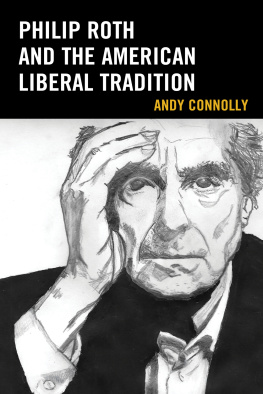
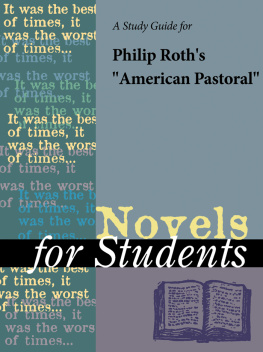

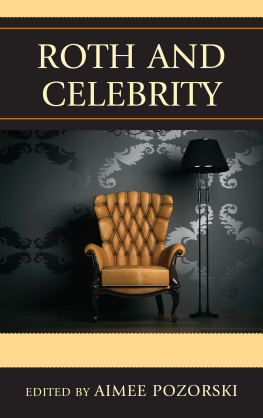

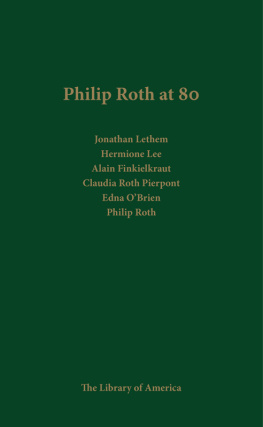
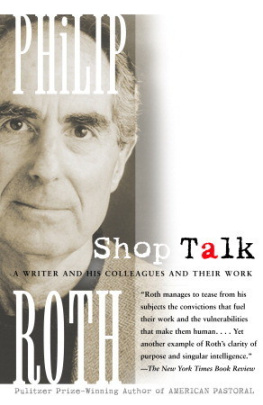
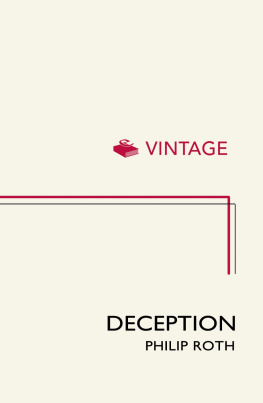
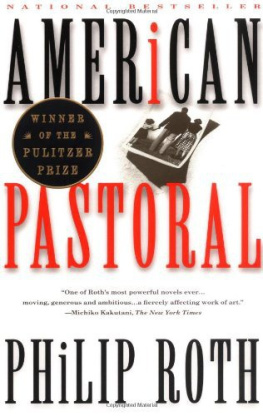
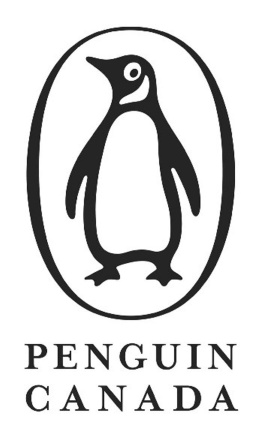
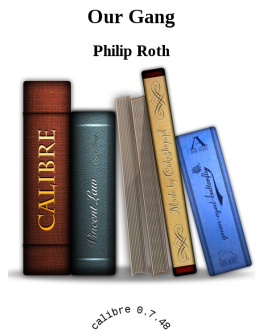
 The paper used in this publication meets the minimum requirements of American National Standard for Information SciencesPermanence of Paper for Printed Library Materials, ANSI/NISO Z39.48-1992.
The paper used in this publication meets the minimum requirements of American National Standard for Information SciencesPermanence of Paper for Printed Library Materials, ANSI/NISO Z39.48-1992.